Daily Vocabulary Words: List of Daily Used Words in Leading International Newspapers
Hi there. Welcome to this special section @ Wordpandit.
Our endeavour here is very simple: to highlight important daily vocabulary words, which you would come across in leading newspapers in the country. We have included the following newspapers in our selection:
• The New York Times
• The Washington Post
• Scientific American
• BBC
• The Guardian
• Psychology Today
• Wall Street Journal
• The Economist
We are putting in extensive work for developing your vocabulary. All you have got to do is be regular with this section and check out this post on a daily basis. This is your repository of words that are commonly used and essentially, we are posting a list of daily used words. Hence, this has significant practical application as it teaches you words that are used commonly in leading publications mentioned above.
Visit the website daily to learn words from leading international newspapers.
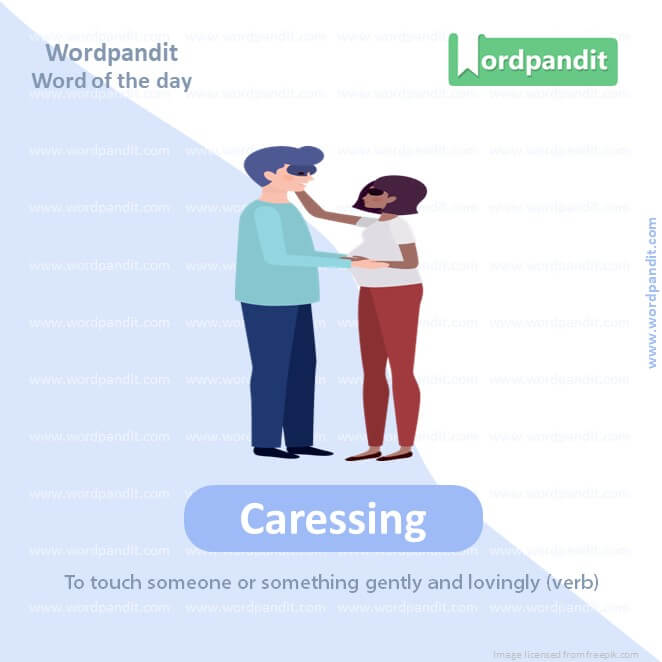
WORD-1: Caressing
CONTEXT: he could claim that the G.O.P. was “on the American side” while caressing pieces of striped, red-and-white nylon.
SOURCE: New York Times
EXPLANATORY PARAGRAPH: Imagine you have a fluffy, soft kitten, and you gently stroke its fur with your hands. You do this softly because you love the kitten and want to make it feel safe and happy. This gentle touching is what “caressing” means.
MEANING: To touch someone or something gently and lovingly (verb).
PRONUNCIATION: kuh-RESS-ing
SYNONYMS: Stroking, Petting, Fondling, Brushing, Cuddling
USAGE EXAMPLES:
1. She was caressing the baby’s back to help him fall asleep.
2. The breeze caressing my face felt refreshing.
3. He sat caressing the old photograph with tender fingers.
4. The artist’s brush caressed the canvas, creating a beautiful scene.
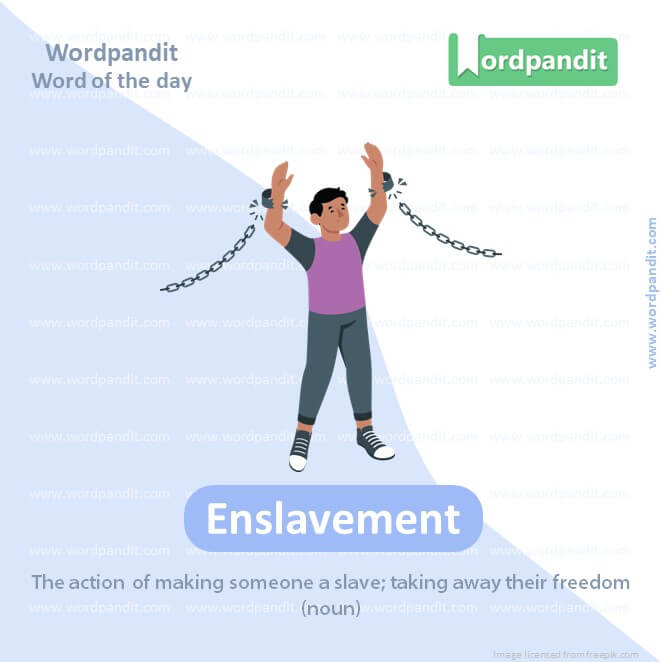
WORD-2: Enslavement
CONTEXT: The rapacious carving up of much of the globe and the genocide and enslavement of millions of people by a handful of European powers for their own enrichment was the great crime of early modernity
SOURCE: New York Times
EXPLANATORY PARAGRAPH: Imagine if someone couldn’t make choices about where they go, what they do, or even when they can rest. This happens when someone is made to work for another person without being allowed to say no, which is called “enslavement.” It’s very unfair and makes people very sad.
MEANING: The action of making someone a slave; taking away their freedom (noun).
PRONUNCIATION: en-SLAYV-ment
SYNONYMS: Bondage, Captivity, Subjugation, Servitude, Thralldom
USAGE EXAMPLES:
1. The history book covered the period of enslavement in ancient civilizations.
2. Campaigns worldwide work towards the end of human enslavement.
3. Enslavement of people in any form is a gross violation of human rights.
4. The museum exhibit depicted the journey from enslavement to emancipation.
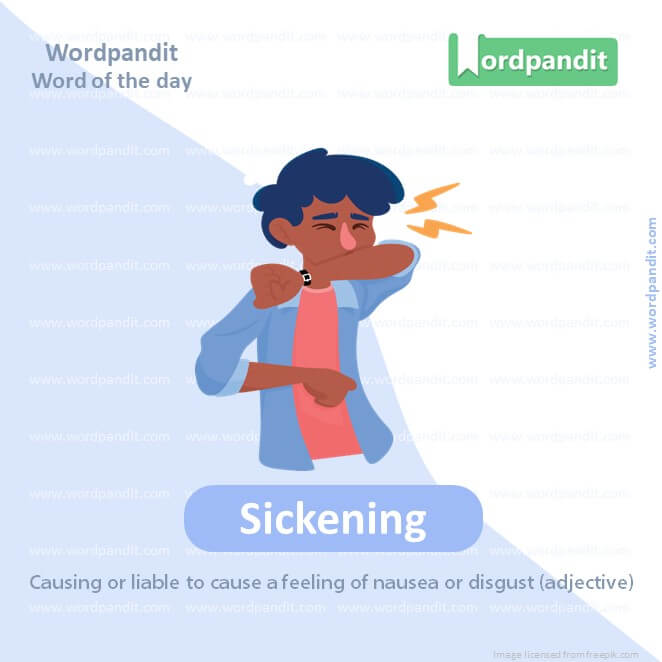
WORD-3: Sickening
CONTEXT: Trump’s bromance with the sociopathic Putin, unimpeded by Putin’s foul bid to swallow Ukraine, grew even more sickening with news that the Russian president’s most potent opponent, Aleksei Navalny, 47, died mysteriously in an Arctic prison
SOURCE: New York Times
EXPLANATORY PARAGRAPH: Imagine you see something so yucky or feel something so bad that your stomach starts to feel weird and you think you might throw up. That’s what “sickening” means. It’s when something is so unpleasant it almost makes you feel sick.
MEANING: Causing or liable to cause a feeling of nausea or disgust (adjective).
PRONUNCIATION: SICK-uh-ning
SYNONYMS: Nauseating, Disgusting, Revolting, Repulsive, Horrifying
USAGE EXAMPLES:
1. The sight of the spoiled food was sickening.
2. He told a sickening joke that made everyone uncomfortable.
3. The news reported a sickening act of violence.
4. The smell from the garbage was absolutely sickening.
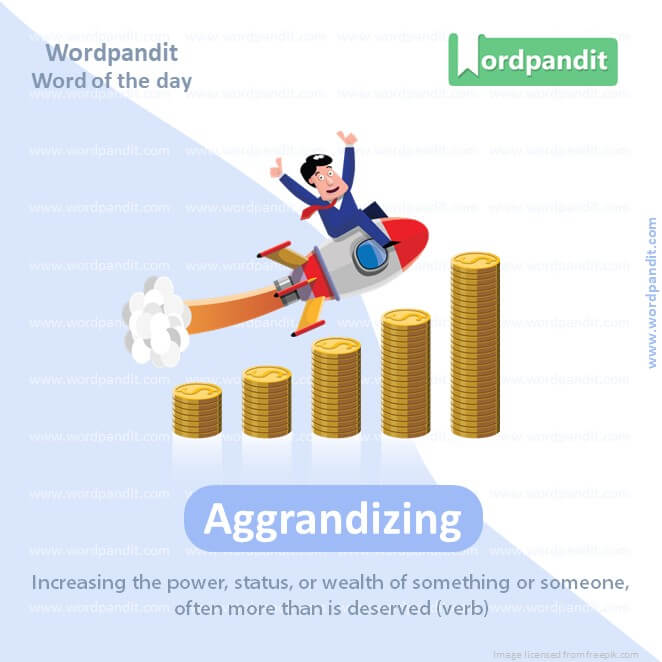
WORD-4: Aggrandizing
CONTEXT: His hallucinatory worshipers admire him as a strongman, even when he’s shown to be liable for sexual assault and an aggrandizing con man whose real estate empire was a Potemkin village.
SOURCE: New York Times
EXPLANATORY PARAGRAPH: Imagine someone telling stories to make their toy seem like the biggest and best toy ever, even if it’s just a regular toy. They’re trying to make it sound more important or better than it really is. That’s what “aggrandizing” means.
MEANING: Increasing the power, status, or wealth of something or someone, often more than is deserved (verb).
PRONUNCIATION: uh-GRAN-dy-zing
SYNONYMS: Exalting, Glorifying, Magnifying, Elevating, Amplifying
USAGE EXAMPLES:
1. The emperor was known for aggrandizing his achievements.
2. Aggrandizing themselves, the politicians made lofty promises.
3. The biography was criticized for aggrandizing its subject’s modest contributions.
4. She accused him of aggrandizing his role in the project.
WORD-5: Sycophants
CONTEXT: The Renfields to Trump’s Dracula are also busy playing sycophants to dictators.
SOURCE: New York Times
EXPLANATORY PARAGRAPH: Imagine someone always saying nice things to the teacher, not because they really mean it but because they want the teacher to like them more or give them better grades. This person is trying too hard to be liked by someone in charge by being overly nice or helpful. They are what we call “sycophants.”
MEANING: People who act overly obedient or flattering to someone important to gain advantage (noun).
PRONUNCIATION: SIK-uh-fants
SYNONYMS: Flatterers, Bootlickers, Brown-nosers, Toadies, Ass-kissers
USAGE EXAMPLES:
1. The king was surrounded by sycophants who never told him the truth.
2. She disliked the sycophants at work who complimented the boss excessively.
3. The celebrity grew tired of the sycophants and yearned for genuine friendship.
4. Sycophants often change their opinions to match those of their superiors.
WORD-6: Indulgent
CONTEXT: His interview with Putin was so indulgent that even Putin complained of a “lack of sharp questions.”
SOURCE: New York Times
EXPLANATORY PARAGRAPH: Imagine you really want a second piece of cake, and even though you know you shouldn’t, you decide to eat it anyway because it makes you happy. Being “indulgent” means you let yourself or others have something enjoyable, even if it’s not always the best choice.
MEANING: Willing to allow excessive leniency, generosity, or consideration (adjective).
PRONUNCIATION: in-DUL-jent
SYNONYMS: Lenient, Permissive, Generous, Tolerant, Forgiving
USAGE EXAMPLES:
1. Her grandmother was indulgent, always baking her favorite cookies.
2. He was indulgent towards his students, often giving them extra time on assignments.
3. The indulgent policy allowed employees more flexible working hours.
4. An indulgent smile crossed her face as she watched the children play.
WORD-7: Emanating
CONTEXT: And I find this kind of talk revealing of a larger trend on the left these days, emanating from important and complex theories in the academy but reflected in crude and reductive forms in the memes and slogans at pro-Palestine protests.
SOURCE: New York Times
EXPLANATORY PARAGRAPH: Imagine you have a scented candle, and when you light it, the smell starts to spread all around the room. That spreading out of the smell from the candle is what “emanating” means. It’s like something coming out or spreading out from a source.
MEANING: To come out from a source (verb).
PRONUNCIATION: EM-uh-nay-ting
SYNONYMS: Emitting, Radiating, Exuding, Discharging, Issuing
USAGE EXAMPLES:
1. A pleasant aroma was emanating from the kitchen.
2. Confidence was emanating from her during the presentation.
3. Light was emanating from the crack under the door.
4. The machine was emanating a strange noise.
WORD-8: Enrichment
CONTEXT: The rapacious carving up of much of the globe and the genocide and enslavement of millions of people by a handful of European powers for their own enrichment was the great crime of early modernity.
SOURCE: New York Times
EXPLANATORY PARAGRAPH: Imagine your plain, boring garden suddenly getting lots of colorful flowers, trees, and maybe even a small pond with fish. It becomes a more interesting and better place. This is what “enrichment” means – making something better by adding value or quality to it.
MEANING: The process of improving the quality or value of something (noun).
PRONUNCIATION: en-RICH-ment
SYNONYMS: Enhancement, Improvement, Augmentation, Fortification, Cultivation
USAGE EXAMPLES:
1. The enrichment of the soil led to a better harvest.
2. The program focuses on the cultural enrichment of its participants.
3. Language courses offer enrichment to one’s education.
4. Financial enrichment was not his goal; personal growth was.
WORD-9: Rapacious
CONTEXT: The rapacious carving up of much of the globe and the genocide and enslavement of millions of people by a handful of European powers for their own enrichment was the great crime of early modernity.
SOURCE: New York Times
EXPLANATORY PARAGRAPH: Imagine a giant monster that keeps eating and taking everything it sees, never feeling full or satisfied. It wants more and more, no matter how much it hurts others. This is what “rapacious” means. It’s when someone or something is very greedy and keeps wanting more.
MEANING: Excessively greedy and grasping (adjective).
PRONUNCIATION: ruh-PAY-shus
SYNONYMS: Greedy, Voracious, Predatory, Avaricious, Plundering
USAGE EXAMPLES:
1. The rapacious developer tore down the old houses to build new ones.
2. Her rapacious appetite for power scared her colleagues.
3. The rapacious invaders looted the town.
4. He warned against the rapacious nature of unchecked capitalism.
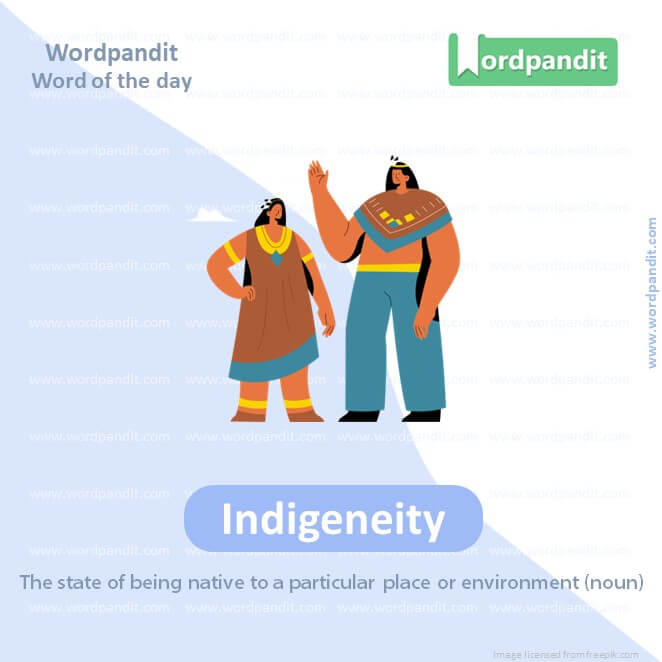
WORD-10: Indigeneity
CONTEXT: Implicit in the emphasis on indigeneity is a promised restoration, albeit one of a very different sort from the imperial fantasies of Vladimir Putin or the gender obsessions of Ron DeSantis.
SOURCE: New York Times
EXPLANATORY PARAGRAPH: Imagine people who were the very first ones to live in a place, long before anyone else came there. They know all about the land, the plants, and the animals because their families have lived there for many, many years. This connection and belonging to the first people of a place is called “indigeneity.”
MEANING: The state of being native toa particular place or environment (noun).
PRONUNCIATION: in-dih-JEN-ay-i-tee
SYNONYMS: Nativeness, Autochthony, Indigenousness, Aboriginality, First-nation status
USAGE EXAMPLES:
1. The festival celebrated the indigeneity of the local tribes.
2. Policies were introduced to protect the indigeneity of the region.
3. She wrote a thesis on the indigeneity and rights of indigenous peoples.
4. Acknowledging the indigeneity of the people was a step towards reconciliation.
Vocabulary list
In navigating the seas of language learning, a ‘vocabulary list’ can often be a dependable guiding star. These collections of words serve as a focused learning tool, yet the technique of mastering a ‘vocabulary list’ effectively requires more than simple perusal. It calls for a smart, sustained approach that amalgamates understanding, memory, and application.
Exploring a ‘vocabulary list’ should be more than a one-way trip. It ought to be more like a round trip, wherein you learn the words, come back to review them, and then set out again for a new voyage. This repeated interactive way of exploring the ‘vocabulary list’ aids in solid memory retention and effective learning.
Next, while dealing with a ‘vocabulary list’, employing memory-boosting techniques can bolster your retention substantially. Here, mechanisms like spaced repetition systems and flashcards can simplify and streamline the process. Moreover, associating words on your ‘vocabulary list’ with visual cues or personal stories can help your brain make strong connections, strengthening your recall ability.
However, the most crucial aspect of learning from a ‘vocabulary list’ is active application. Conquering a list without using the words in real-world contexts might leave you with fleeting knowledge. Hence, make it a point to integrate these learnt words into your daily interactions, be it on social media, in email exchanges, or casual conversations. The regular utilization reinforces your understanding and brings the ‘vocabulary list’ to life.
Conclusively, the ‘vocabulary list’ is a treasure trove in a language learner’s quest, waiting to be unlocked strategically. Through the trinity of review, memory-enhancing techniques, and active application, one can master any ‘vocabulary list’. So, take charge of your learning journey and set sail with your ‘vocabulary list’, charting the vast and fascinating seas of language.







